Homemade Bouillon Powder
Homemade bouillon powder is a great idea for all sorts of reasons. Let’s talk about how to make a version that is better than store-bought with no artificial flavors or ingredients.
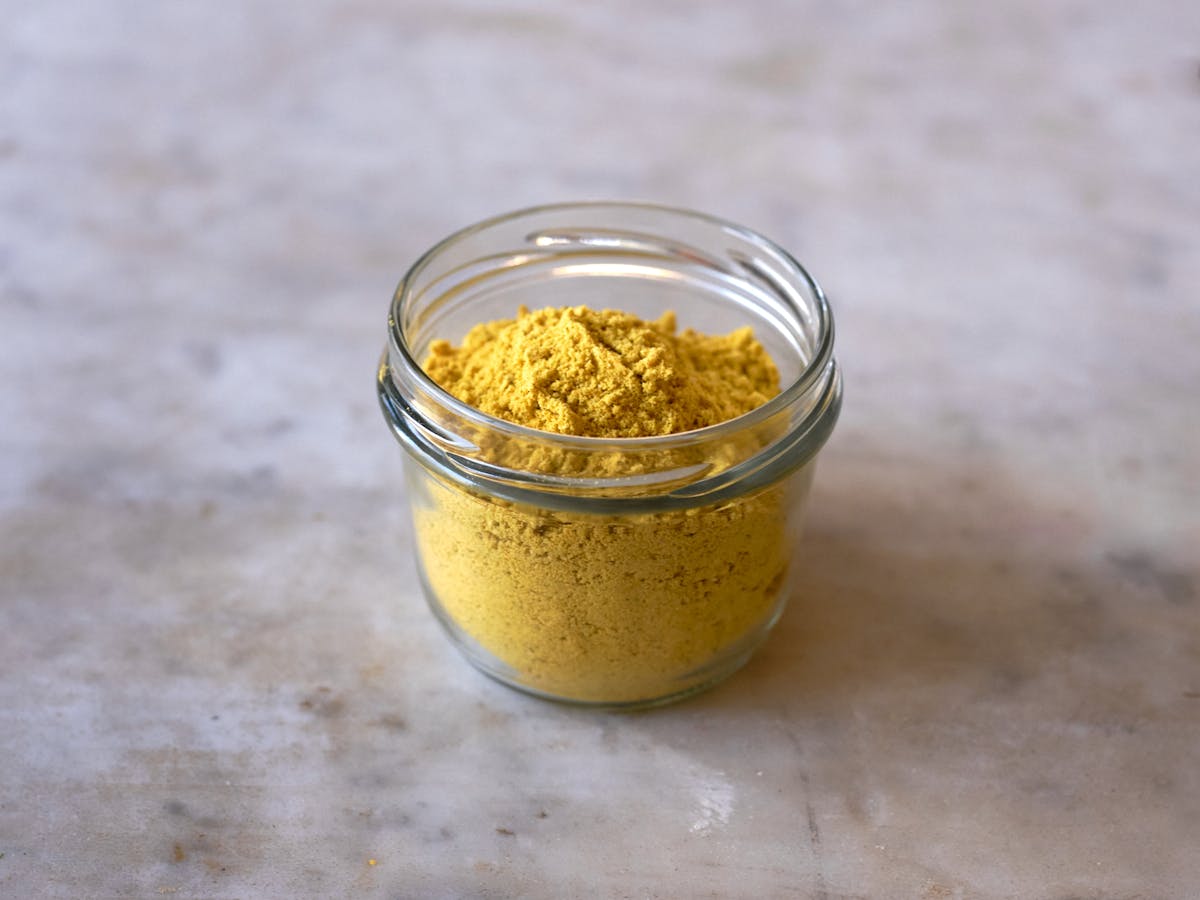
Let’s talk about bouillon and the reasons I’ve started to make my own homemade bouillon powder. I found myself surveying vegetarian bouillon options last year when I started pre-mixing dry ingredients for soups and stews to take on our camping trips - meals in jars. I wanted to have amazing, quick, one pot meals I could make by adding water and just one or two other common pantry items like crushed tomatoes or chickpeas. In a couple of the soup mixes I call for a bouillon cube. Bouillon cubes are a super handy way to get a jumpstart on introducing flavors - whatever you’re cooking. That said, many of the commercially available options are very salty, have artificial ingredients and flavor enhancers, and a good number of you wrote to me asking for suggestions. So here we are, let's make our own!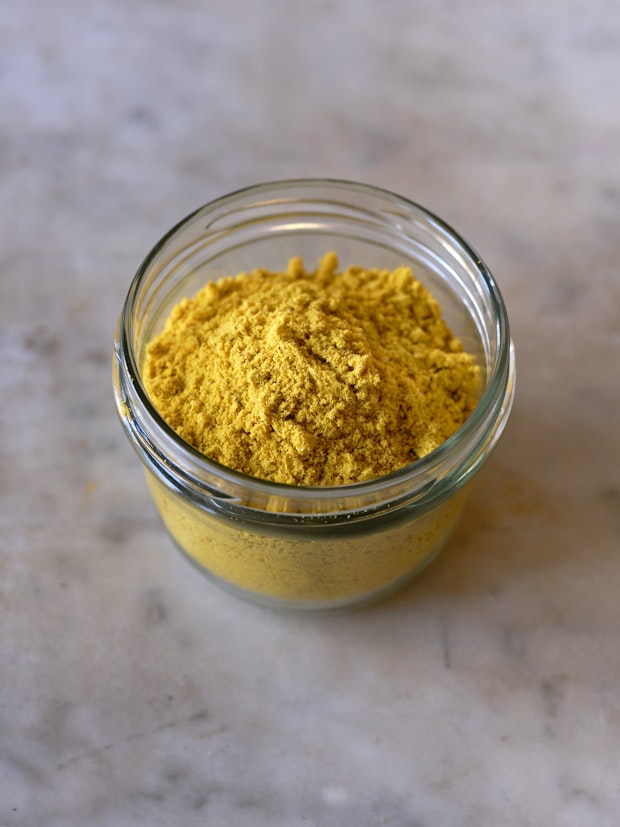
What is Bouillon?
Technically, a bouillon cube is a dehydrated cube or powder used to create an instant stock. You see a range of bouillon in stores, often available as vegetable, meat, or chicken bouillon. It is used to make quick, flavorful broth when cooking soups, stews, grains, risottos, curries, and the like. They’re a great way to introduce depth and flavor to your cooking. Bouillon cubes are quite common in stores, and bouillon pastes seem to be increasingly common. 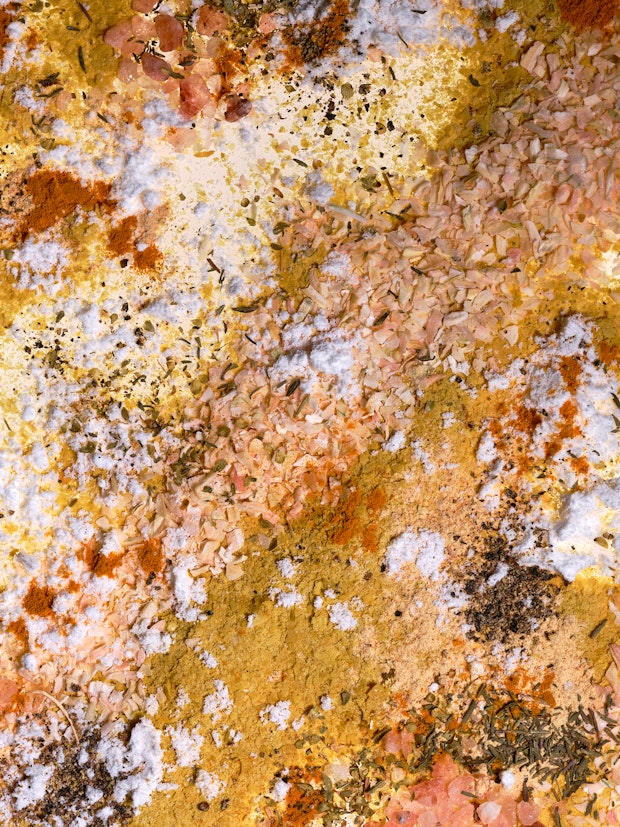
What is store-bought bouillon made of?
I’ve looked at the labels on many packages of bouillon in stores. Some of the ingredients I’ve seen on store-bought bouillon cubes include: maltodextrin, natural and artificial flavors, MSG, wheat flour, disodium inosinuate, and disodium guanylate. There’s usually some sort of fat component (for example: palm oil, soybean oil, canola oil), along with a sweetener. It's tricky to find a readily-available bouillon option made with natural, minimally processed ingredients. The good news is it is exceptionally easy to make your own homemade bouillon powder.
How To Make Bouillon Video
Canned broth versus bouillon?
For my purpose of making dry soup mixes in a jar (like this or this), pre-made broths weren’t an option, but I’ll weigh in here anyway. I’m a hard-pass on most canned broth or pre-made broth in cartons. I generally don’t like how they taste - often muddied flavors or salty. I actually prefer to start with water and control salt levels myself, and will choose this route over packaged broths nearly always. I do love this homeamde bouillon paste from years back, but it doesn’t work if you’re pre-prepping dry ingredients.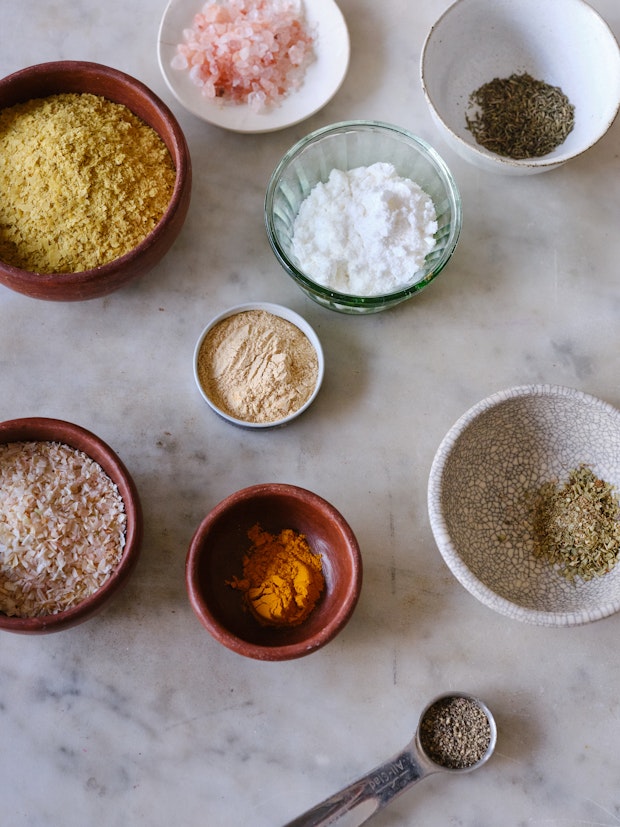
Homemade Bouillon Powder Ingredients
Ok! Let’s talk though the ingredients in this DIY bouillon, so you’ll have a better understanding of where we landed for the “base” recipe. I’m also going to follow that up with a number of variations. The recipes are all for a general vegetarian bouillon, but there are endless ways for you to adapt the recipe with seaweed, or mushroom powder, or chiles to swing the flavor profile in one direction or another. That said, the key is nailing down your base bouillon recipe first!
- Nutritional Yeast: My love for nutritional yeast runs deep and it’s a non-negotiable in this bouillon powder. It’s rich in flavor, body, and b-vitamins. It’s the backbone of this recipe and delivers umami-rich, chicken soup broth vibes. I’m not sure if there’s any truth to this, but I swear nutritional yeast is what makes my hair and nails grow extra fast.
- Salt: I’ve been conflicted about how much salt to put in this base recipe. I was tempted to make it sodium-free or low-sodium, instructing people to salt to taste while cooking. But I think part of the wild popularity of bouillon and pre-made broths is that it helps home cooks season their food more than they might otherwise? In a good way. I landed on a ratio of 1 tablespoon of salt to 1 cup nutritional yeast, and that would yield the equivalent of 24 bouillon cubes. I like how this tastes as a baseline, while leaving room to add more salt if you like.
- Herbs & Spices: I like the combination of oregano and thyme here. It works with a lot of recipes and the scent and flavors of the brothy herbs is nostalgia triggering for me. I boost this powder with a bit of turmeric, black pepper, onions and garlic. I’ve used it in brothy soups and spicy curries and it works great.
- Coconut Milk Powder: This is my wildcard. I noticed a lot of the commercial bouillons have ingredients that seem to be included to thicken broth and give it a bit of fatty mouth feel. I’ve been playing around with a bag of coconut milk powder recently, and though it might work nicely here as an optional add. In the context of the other ingredients in the bouillon it isn’t overly strong on the coconut front, but does bring a nice amount of body. I’ve also been adding the powder to these Spicy Coconut Curry Noodles, and this Tortellini Soup instead of bringing cans of coconut milk out with us and it works great.
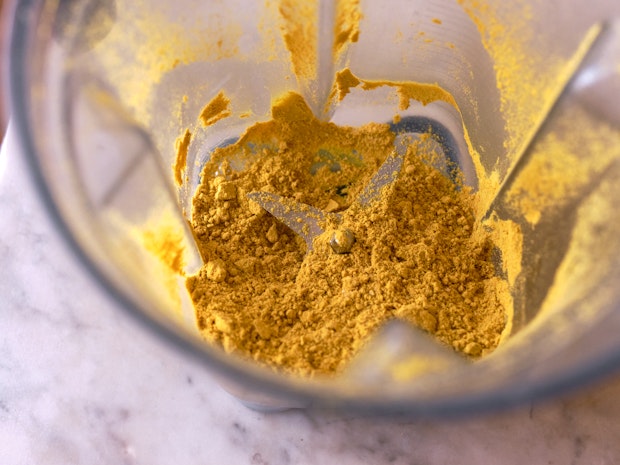
Homemade Bouillon Powder Variations
- Nori Bouillon Powder: If you’re looking for a bouillon powder that is flavored more like the sea, I like to lightly toast a sheet of nori and pulse that into my bouillon powder.
- Mushroom Bouillon Powder: There are many amazing mushroom powders and dried mushrooms available to cooks now. Adding 2 teaspoons of your favorite powder this recipe or 1/4 cup chopped dried culinary mushrooms before blending is a fun direction to explore.
- Spicy Bouillon Powder: I tend to keep my spicy components separate from my bouillon. This allows you to control those ingredients independently. That said, adding a couple dried chiles (or blend of dried chiles) to your bouillon mix might be you path to the ultimate spicy broth over time.
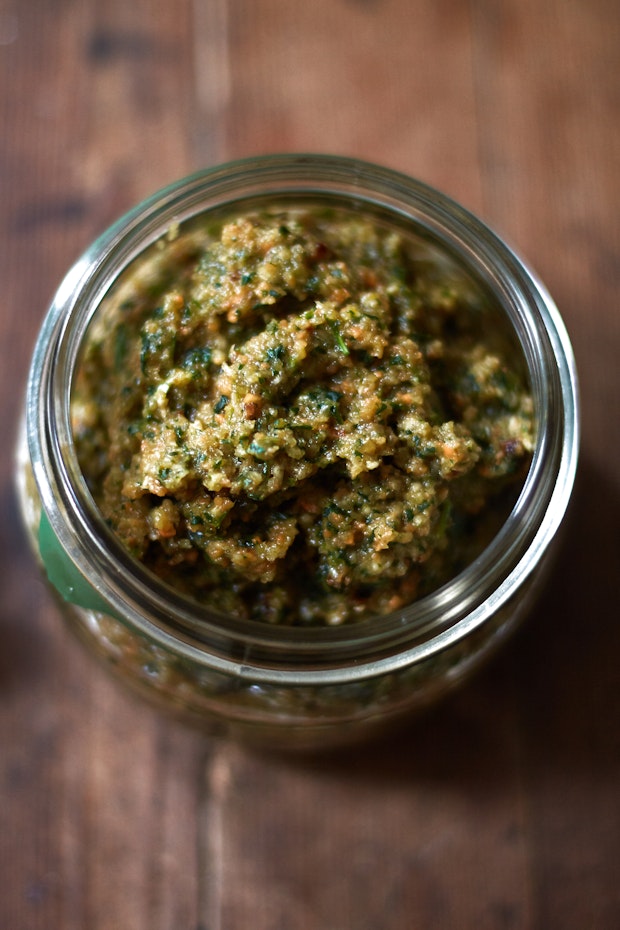
Homemade Bouillon Paste
If having a dry bouillon isn’t important to you, this is another option. Pam Corbin included a homemade bouillon paste in the back of the River Cottage Preserves Handbook, and people love it. It’s a beautiful, pureed, concentrated paste of vegetables and herbs, preserved with salt.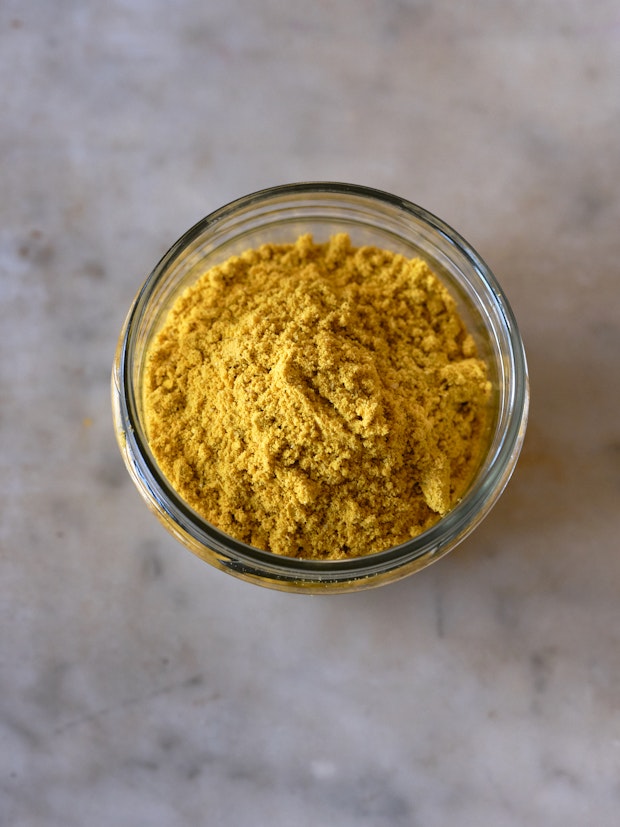
More Ideas
This bouillon powder isn't just for broths and soup. I've been sprinkling it on buckwheat crepes as they start to set, so good! It's also really delicious dusted across a bowl of popcorn. Or as a finishing magic touch on a simple bowl of rice.
Have fun with the bouillon and let me know if you take it other directions, I’ve love to hear about it. Here are some links to soup recipes to put it into play. Favorites for this bouillon powder include - Meal in a Jar: Tortellini Soup, Meal in a Jar: Italian Barley Soup, and Meal in a Jar: Spicy Coconut Curry Noodle Soup, Vegetarian Tortilla Soup, Vegetarian Split Pea Soup, or this Vegetable Noodle Soup.
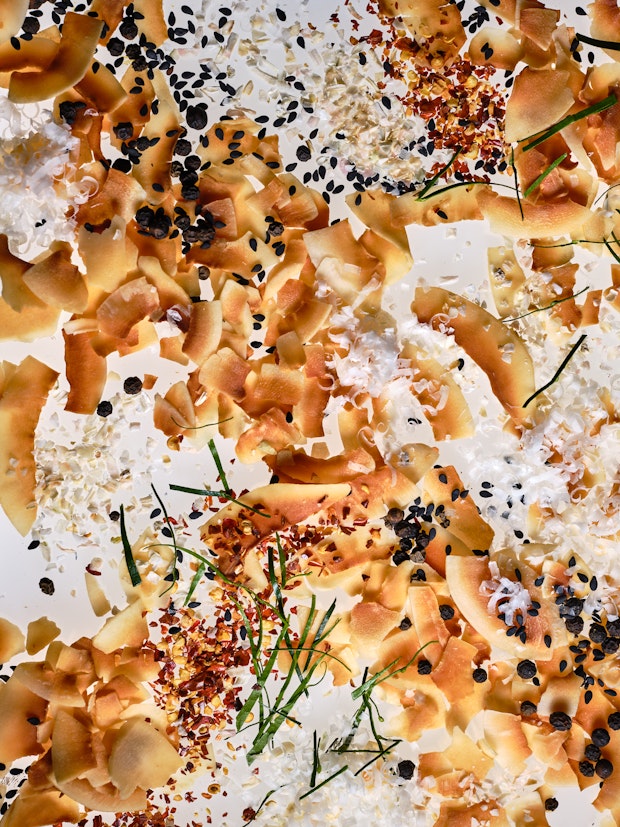
If these sorts of seasonings and spices are your thing (I love them!), be sure to check out this post of 8 Homemade Spice Blends. I made a downloadable PDF of a number of my favorite spice blend recipes and on that page you can take a closer look, and you can use this bouillon powder in a number of them!
More Homemade Spice Blends
Homemade Bouillon Powder
I’ve been playing around with coconut milk powder and really enjoying it, but it’s optional here. I go into more detail about it up above. Use 1 tablespoon of bouillon powder in place of one bouillon cube. So, if a recipe calls for one bouillon cube, use 1 tablespoon of this powder.
- 1/2 cup nutritional yeast
- 1/2 tablespoon fine grain sea salt
- 3 tablespoons dried minced onion or 1 tablespoon onion powder
- 1/2 teaspoon ground turmeric
- 3/4 teaspoon dried oregano
- 3/4 teaspoon dried thyme
- 1 tablespoon garlic powder
- 1/2 teaspoon freshly ground black pepper
- 2 tablespoons coconut milk powder (optional)
-
Combine all the ingredients in a blender. Pulse until everything is finely ground and powdery, a minute or so.
-
Transfer to a jar and keep in a cool and dark place for up to a couple of months. Use 1 tablespoon of bouillon powder in place of one bouillon cube.
Makes 12 tablespoons.


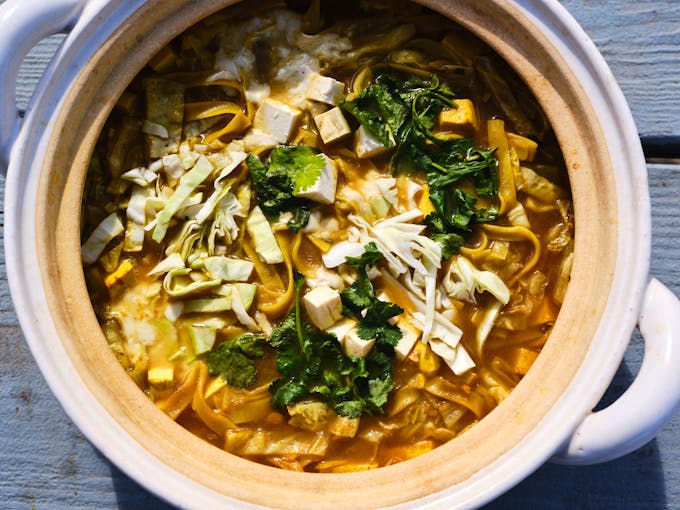
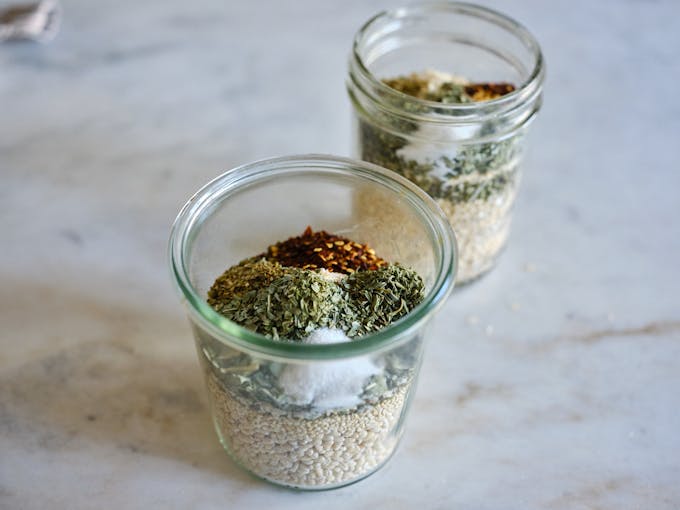
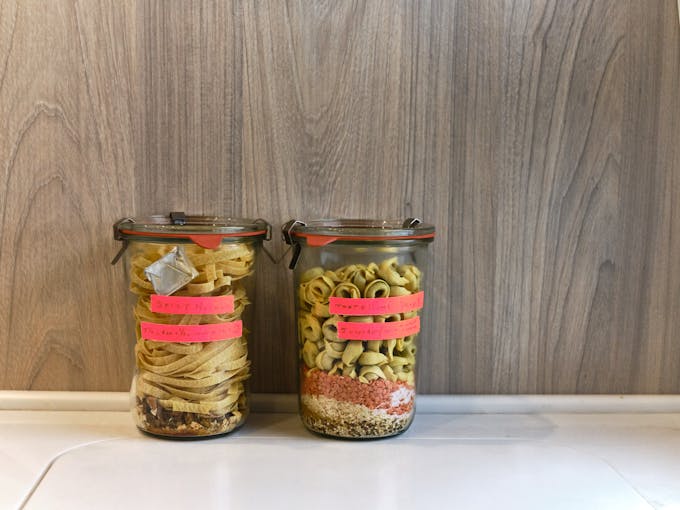

Post Your Comment
Comments
My husband has an intolerance to coconut milk. What alternatives would you use. He generally uses oat milk. Would this work?
Hi Tina – you can leave the coconut milk out in the bouillon – no problem.
A nice tip I got a while back was to add agar agar powder to vegan veg stock. It mimics the feeling of collagen and fat in chicken stock and helps it to coat the mouth. Don’t overdo it, start with 1/4 teaspoon and maybe up to 1/2 or a full teaspoon depending on how thick you want it, and personally I would switch out the coconut milk. Also MSG gets a bad wrap and while it’s not for everyone, I always add a little bit into my stocks.
Thanks for the tip Tony!
I’ve made this a couple times now and will continue to use this instead of commercial bullion. I blended in some dried porcini and it makes an excellent base for miso.
Yes! The dried porcini add is fantastic.
I cannot wait to try the Homemade Bouillon Powder. I’m planning for Christmas gifts. Thank you for all of your recipes.
Very impressed—won’t be buying store bought again!! I did 2 versions a regular and a smokey (bc when I ordered my n.y., the offered a smoked n.y.). For my base, I used onion powder, garlic, black pepper, turmeric, sweet Hungarian paprika, sumac, marjoram, thyme, oregano, the last half of a jar of herbs de Provence, plus dehydrated shredded zucchini-yellow squash-carrots-carrot tops, and portobellos. I used a 1/4 c of base to 1/2c n.y.-2T coconut powder-1/2T Himalayan salt. The smoked, adjusted the salt down to 3/4t. Def hits the umami notes. And best yet, my the sugar-salt addict who lives in my house very much approves. (My 82 year old mother)
Love it Karen! Thanks for reporting back – love hearing about your versions!
Great idea! However, if these are all dried spices, why wouldn’t they last much longer?
which coconut milk powder would you recommend?
Hi Hana, there are a number of good brands if you do a quick search for organic dried coconut milk.
Looking forward to trying this recipe! How long does it stay good for?
Hi Chris – I store it in the refrigerator for up to a month, and move any that I won’t use in that time frame to the freezer.
For thickening soups I like to blitz old fashioned oatmeal in a blender to a
Powder. It thickens and private rich silky mouthfeel as if you added cream.
Love this tip Julie – thanks!
Love this idea and can’t wait to try it! On the subject of a “thickening” agent, I’ve lately been adding a teaspoon or so of chick pea flour to my soups to thicken them – just a little really works, and it offer it as a good alternative to the coconut milk powder; it too is vegan, but perhaps more easily found in markets these days!
Love this idea Dishelle – thanks for sharing!
I love making my own bouillon powder tell me that they love my recipe. It’s super easy to make and very flavorful. I recommend trying it out for yourself!
Love this! So would you say 1 tbsp for every 2 cups of water if it’s being used as a soup stock base? I use rapunzel cubes and that ratio is one cube for every 2 cups of water.
Hi Shauna – yes, start with that and then you can adjust to your liking with more water or more bouillon. That’ll likely be pretty strong, assertive. I usually end up using just one cube whether it is commercial or homemade bouillon to control the salt levels, and then season to taste at the end, if that makes sense. This bouillon is a bit less salty. A long way of saying, you can start with less, and then add more bouillon powder to taste as you’re cooking your soup. Hope this helps!
More Recipes
Weekly recipes and inspirations.
Popular Ingredients